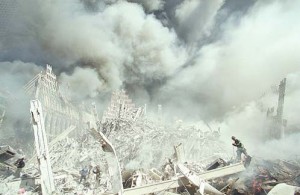9/11: More than meets the eye
Richard Falk, Sunday 09 November 2008, The Journal Issue 13
 Every so often attention is called anew to the doubts surrounding the true character of the events surrounding the 9/11 attacks. Recently, the report of the collapse of Building 7 represented such an occasion. Any close student of 9/11 is aware of the many serious discrepancies between the official version of what took place and the actual happenings on that fateful day in 2001. David Ray Griffin and others have analyzed and assessed these discrepancies in such an objective and compelling fashion that only wilful ignorance can maintain that the 9/11 narrative should be treated as a closed book, and that the public should move on to address the problems of the day.
Every so often attention is called anew to the doubts surrounding the true character of the events surrounding the 9/11 attacks. Recently, the report of the collapse of Building 7 represented such an occasion. Any close student of 9/11 is aware of the many serious discrepancies between the official version of what took place and the actual happenings on that fateful day in 2001. David Ray Griffin and others have analyzed and assessed these discrepancies in such an objective and compelling fashion that only wilful ignorance can maintain that the 9/11 narrative should be treated as a closed book, and that the public should move on to address the problems of the day.
To accept such a view is to acquiesce in what can be described at best as governmental evasiveness and irresponsibility, a resolve to leave the discrepancies unexplained. It is not paranoid under such circumstances to assume that the established elites of the American governmental structure have something to hide, and much to explain. What has not been established by the “9/11 Truth Movement” is a convincing counter-narrative – that is, an alternate version of the events that clears up to what degree, if at all, the attacks resulted from incompetence, deliberate inaction, and outright complicity.
For democratic government to work, citizens must never refrain from seeking answers to the most difficult questions. Here, what is at stake is enormous. It is not only the memory of those killed and deprived by the attacks, but also the fashioning of a climate of opinion that gave rise to international wars, as well as led to widespread denial of rights under the pretext of “homeland security” and counter-terrorism. There is also a profound challenge to the legitimacy of a governing process that stands accused of letting such crimes take place, if not aiding and abetting their commission and subsequent cover-up.
It might be asked whether it is not just an expression of morbid curiosity for non-Americans to harp on this issue of finding out the truth about what happened on 9/11. My response is that what takes place in the United States often has global reverberations, and never more so than in this instance. The US is the first truly global state in history, with its military presence established worldwide by more than 700 overseas bases, by navies in every ocean, and by the military domination of space.
The brighter side of US influence was revealed recently by the sense of peoples around the world that the election of Barack Obama as the new American president was a global event, and not just a national election. But what should be obvious is that the 9/11 experience has been relied upon to wage bloody wars in Iraq and Afghanistan, and to underwrite a disastrously conceived “war on terror” that should be concern of everyone on the planet.
From this perspective, and given the dark cloud of doubt that lingers over the official 9/11 narrative, why was the issue not even discussed during the many months of presidential campaigning? As far as I know it was never mentioned. And the explanation is not the urgency associated with the widening economic crisis or the tactical interest of the Democrats to avoid offending Republicans in their search for support across party lines. The truth is deeper, and far more disturbing.
As far as I can tell, the real explanation is a widely shared fear of what sinister forces might lay beneath the unturned stones of a full and honest investigation of 9/11. Ever since the assassinations in the 1960s of John F. Kennedy, Martin Luther King, and Malcolm X there has been waged a powerful campaign against “conspiracy theory” that has made anyone who dares question the official story to be branded as a kook or some kind of unhinged troublemaker. In this climate of opinion, any political candidate for high office who dared raise doubts about the official version of 9/11 would immediately be branded as unfit, and would lose all political credibility. It is impossible to compete in any public arena in the United States if a person comes across as a “9/11 doubter.”
A few talk show hosts, investigative citizens, and publishers have kept a low flame of controversy burning sufficiently to sustain a large and growing grassroots constituency that shares the view that the truth about the 9/11 events is not yet known, or more radically, that the truth is known but being actively suppressed. These doubters are determined to continue their difficult quest for truth, and this could possibly result in disclosures at some point that are sufficiently dramatic to force the issue onto the public stage – where it belongs.
The persisting inability to resolve this fundamental controversy about 9/11 subtly taints the legitimacy of the American government. It can only be removed by a willingness, however belated, to reconstruct the truth of that day, and to reveal the story behind its prolonged suppression. What exactly that truth would be is certainly unknowable at present, and even an honest, collaborative effort might never altogether remove doubts. But that honest effort is just what should be demanded and expected by persons of good will everywhere.









Leave your response!